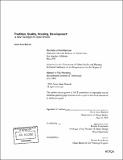Tradition, quality, housing, development : a new paradigm for urban Bhutan
Author(s)
Bennett, Alexis Anne, 1974-
DownloadFull printable version (27.62Mb)
Other Contributors
Massachusetts Institute of Technology. Dept. of Urban Studies and Planning.
Advisor
Dennis Frenchman.
Terms of use
Metadata
Show full item recordAbstract
This research examines practices that achieve an urban fabric unique to its cultural heritage by promoting innovation in local building industries while embracing notions of urban livability. Prevailing urban livability theorists argue that built form is a physical manifestation of the expression of culture and agree that cultural heritage is important to a community's sustainability and identity. The central hypothesis is that "Quality" in the built environment in Bhutan is accomplished only by employing traditional building practices. "Quality", as defined here, is achieved when two factors are satisfied: 1) the construction is equal to or above established standards and, 2) the construction practice possesses the distinct characteristics of the culture. This hypothesis is tested through five case studies of current buildings in urban centers and through various discussions with design professionals, construction practitioners, government officials and others in Thimphu, Bhutan. The Royal Government of Bhutan is at the forefront of cultural heritage initiatives and has been celebrated for its progressive Gross National Happiness (GNH) development vision, a document that articulates the criteria for defining the distinct characteristics of the Bhutanese culture. However, the government has been challenged to implement this vision while facing the rapid development of its nascent urban centers. As part of the conclusion, the thesis proposes the establishment of a research institute, The Housing Research Institute of Bhutan, for the study of responsible building practices in support of GNH. The mission would be to inform design, development and construction processes formulated from the collection and dissemination of information, promotion of knowledge exchange, and support of research on materials, regulation, management and design through building demonstration projects. The institute will act as a conduit for the convergence of information and priorities between industry, contractors, government agencies and the public.
Description
Thesis (M.C.P.)--Massachusetts Institute of Technology, Dept. of Urban Studies and Planning, 2002. Includes bibliographical references (p. 147-149).
Date issued
2002Department
Massachusetts Institute of Technology. Department of Urban Studies and PlanningPublisher
Massachusetts Institute of Technology
Keywords
Urban Studies and Planning.